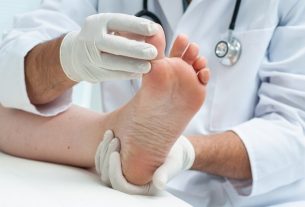Recovery after bariatric surgery can take between 6 months and 1 year, and it is possible to lose between 10% and 40% of your initial weight during this period, being faster in the first months of recovery.
In the first few days after bariatric surgery, recovery takes place in the hospital under the supervision of the surgeon, anesthesiologist and nurse, with intravenous serum administered to hydrate and give the body energy to recover, in addition to pain medication. During this period, the physiotherapist may also recommend breathing exercises to prevent pulmonary complications. See breathing exercises to breathe better after surgery.
During recovery from bariatric surgery, it is important to follow medical recommendations regarding diet, scar dressing and return to activities of daily living and physical exercise, to have a smooth recovery and avoid complications, such as infections or nutritional deficiencies.

1. Diet after bariatric surgery
Approximately 3 days after bariatric surgery, the diet should consist of liquid foods, such as vegetable broth, gelatin and protein supplements, which should be ingested every 30 minutes and in small quantities, maximum 50 ml of each time, as the stomach is still very sensitive.
Generally, 3 to 4 weeks after bariatric surgery, a soft diet can be started, including crushed or pureed foods. Between 30 and 45 days after bariatric surgery, you can start eating more solid foods, as recommended by your doctor or nutritionist. See what nutrition should be like after bariatric surgery.
Furthermore, the doctor or nutritionist may recommend the use of vitamin and mineral supplements, as bariatric surgery can reduce the absorption of nutrients, such as folic acid, calcium, iron or B vitamins, increasing the risk of nutritional deficiencies.
See more details about the diet after bariatric surgery in the following video:
2. Bariatric surgery dressing
After bariatric surgery, such as gastric banding or bypass, the person will have bandages on the abdomen that protect the scars, which must be evaluated by a nurse and changed at the health center or hospital one week after surgery. During this week, the dressing should not be wet to prevent the scar from becoming infected.
Furthermore, 15 days after surgery, you must return to the health center or hospital to remove the staples or stitches and, after removing them, the doctor may recommend applying moisturizing cream daily to the scar to hydrate it.
3. Physical activity
During the first week after surgery, while still in the hospital, you can perform light exercises with your legs and feet, with the help of a nurse or physiotherapist, and you can also get out of bed and take short walks to avoid the formation of clots in the legs, always respecting the limitations of the body and medical instructions.
After discharge from hospital, physical activity can be started little by little, taking short walks, gradually increasing the distance, as, in addition to helping to lose weight, it helps to reduce the risk of developing thrombosis and contributes to the intestine functioning properly. correct. However, long walks, exertion, carrying weight and doing sit-ups should be avoided in the first month after surgery.
Furthermore, two weeks after bariatric surgery, you can return to work and do your daily activities, such as cooking, walking or driving, for example.
4. How to relieve pain after surgery
After bariatric surgery, it is normal to feel pain, which is why analgesics are administered while still in the hospital to alleviate the pain. Furthermore, during the first month, you may have abdominal pain, which decreases over time. In this case, the doctor may recommend the use of analgesics, such as paracetamol or tramadol, to relieve pain and increase well-being.
In the case of laparotomy surgeries, where the abdomen is opened, the doctor may also recommend the use of an abdominal band to support the belly and reduce discomfort.
Warning signs to see a doctor
It is important to consult the surgeon or seek the nearest emergency room if symptoms arise, such as:
- Fever greater than 38ºC;
- Dressing with yellow, green and/or unpleasant-smelling liquid;
- Redness, swelling or tenderness in the scar;
- Very severe pain in the abdomen that does not go away with painkillers;
- Diarrhea or constipation 2 weeks after surgery;
- Nausea or vomiting, even when eating food in the quantities recommended by the nutritionist;
- Cough, chest or leg pain, or shortness of breath.
In these cases, the doctor must evaluate the symptoms and can advise the most appropriate treatment, if necessary.

Sign up for our newsletter and stay up to date with exclusive news
that can transform your routine!
Warning: Undefined array key "title" in /home/storelat/public_html/wp-content/plugins/link-whisper-premium/templates/frontend/related-posts.php on line 12
Warning: Undefined array key "title_tag" in /home/storelat/public_html/wp-content/plugins/link-whisper-premium/templates/frontend/related-posts.php on line 13



